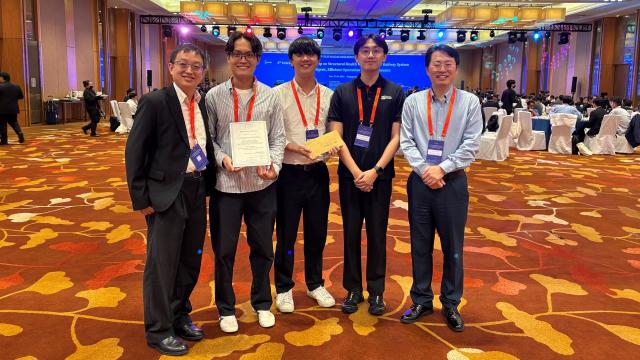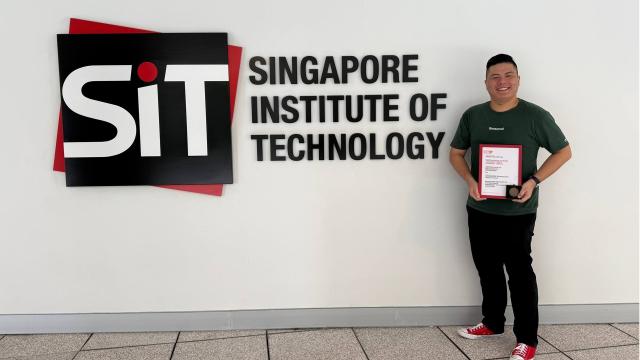SIE (Land) MEngTech programme with Bachelor of Engineering (Sustainable Engineering [Land]) degree programme recently attained full accreditation from the Engineering Accreditation Board (EAB) of Institution of Engineers Singapore (IES) for five years from 2020 to 2025. Here’s everything you need to know about this milestone event.
What is the significance of this accreditation for SIT engineering graduates?
This is a significant achievement that will boost the career aspirations and opportunities for future graduates! SIT graduates of accredited programmes are automatically recognised globally by 21 jurisdictions under the Washington Accord framework. The full accreditation certified by EAB of IES means that these SIT engineering degree programmes are accredited to have satisfied all academic requirements for the practice of engineering at the professional level and benchmarked to have met the standards of other mutual recognition agreements entered into by EAB, including the Washington Accord (WA). IES is the Singapore signatory to the Washington Accord since 2006.
What is the Washington Accord?
It is an international agreement signed between engineering accrediting bodies responsible for carrying out accreditation of engineering degrees in their home country. This agreement upholds the standards of engineering education among engineering educations, provides mutual recognition amongst signatories that the accredited programmes have satisfied the academic requirements for the practice of engineering at the professional level. The accreditation process and quality benchmark of each signatory are subject to periodic reviews by a three-member team appointed by the Washington Accord among its signatories.
Visit https://www.ieagreements.org/accords/washington/ to learn more.
How will this benefit SIT engineering students taking the accredited courses?
SIT graduates with an accredited engineering degree can seek registration as professional engineers from Professional Engineering Board (PEB) of Singapore and as Chartered Engineers (Railway and Transportation) from IES. This will enhance their career advancement opportunities and widen their professional practice and contribution towards Singapore land transport development.
Our engineering graduates would also be able to gain professional registration and practise in countries that are full signatories to the WA. The mutual recognition framework by WA enhances the mobility of professional engineers. SIT graduates can explore exciting employment opportunities beyond the shores of Singapore.
How does a programme get accreditation?
It is a very rigorous process! The accreditation evaluation process is based on a robust assessment of 11 quality criteria a programme must develop. This takes place over many years through a continual quality improvement process involving a team of academics in consultation with the local industry. The overarching holistic evaluation looks at the attainment of graduate attributes, which relate to the knowledge, skills, and behavioural traits students demonstrate at the time of graduation.
What else is involved in the process?
Each programme submitted for accreditation is evaluated by a three-member team of highly-qualified and competent evaluators appointed by EAB-IES. The team comprises a distinguished overseas professor and two evaluators from local academia and industry. As part of the accreditation process, a thorough examination of the documentary evidence, provided in the form of a comprehensive self-assessment-report, is carried out together with an on-site visit.
The visit lasts two to three days, during which the evaluators further examine physical evidence and conduct interviews with the management, programme leaders, industry advisory members, alumni, faculty, and students.
As part of the process, the programme evaluators will provide independent feedback to SIT for the continual improvement of educational programmes to better meet the needs of the local industry. An engineering programme submitted for accreditation or re-accreditation is expected to satisfy all criteria during the full term of accreditation. Therefore, the programme needs to conduct internal reviews periodically on its strengths and weaknesses.
After attaining full accreditation, SIT will continue to improve programme standards and quality, and address any shortcomings that do not meet the accreditation criteria.















![[FA] SIT One SITizen Alumni Initiative_Web banner_1244px x 688px.jpg](/openhouse2025/openhouse/sit-teaching-and-learning-academy/directory/centre-professional-communication/directory/centre-professional-communication/sit-teaching-and-learning-academy/sites/default/files/2024-12/%5BFA%5D%20%20SIT%20One%20SITizen%20Alumni%20Initiative_Web%20banner_1244px%20x%20688px.jpg)


